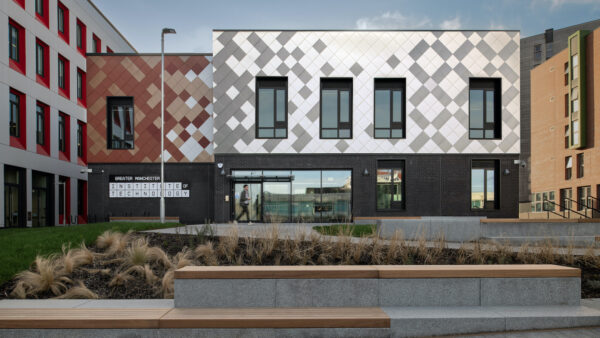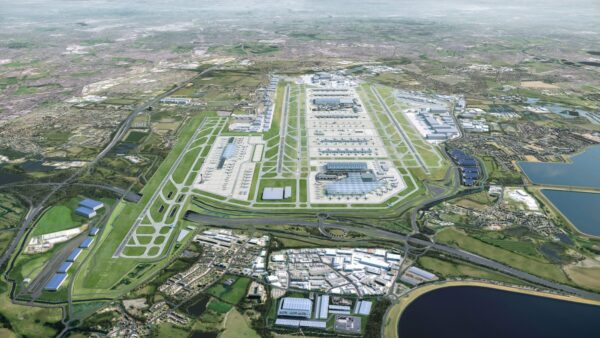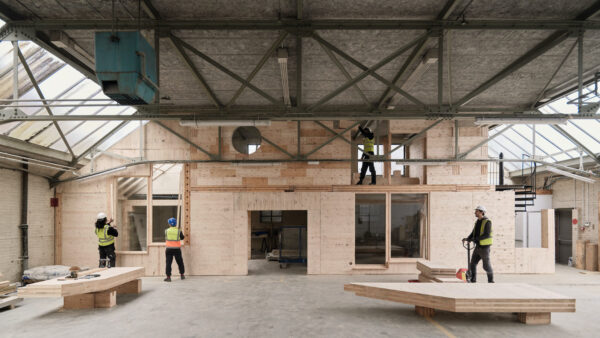
Chris Soffe is the CIOB’s first US-based president. He explains to Will Mann why climate change and collaboration among institutions will be two of his key focus areas over the next 12 months.
Inclusive language and strong environmental messages are not what we’ve come to expect from a US-based president. But that’s exactly how Chris Soffe, CEO of Gleeds Americas and the new Chartered Institute of Building (CIOB) president, communicates.
“Our global society faces huge challenges in terms of increasing urbanisation, outdated infrastructure, climate change and much more – but we are only going to solve them by working together,” says Atlanta-based Soffe, who becomes the institute’s first US president this month. “We need to be building bridges, not putting up walls.
“That applies to the construction industry too,” he continues. “These challenges have to be met by several institutions working together, including the CIOB. It is important that the institutions’ various initiatives coalesce with the aim of achieving common goals for the industry.”
UK-born Soffe, who has recently obtained dual citizenship, sees these infrastructure and urbanisation challenges at first hand in his home city.
“In the 30 years I have been in Atlanta, the population has grown from 2.7 million to 6.5 million, and the traffic congestion is terrible,” he says. “We’ve been trying to pave our way out of the problem but it’s not the solution. We are big proponents of expanding rapid transit systems, a far more sustainable approach to urban transport, but that’s not happening here at present.”
Chris Soffe CV
- CEO of Gleeds Americas.
Regional director on the Gleeds International Board. - Responsible for North American and Caribbean operations with offices in Atlanta, New York, Chicago, San Francisco, Austin, Charlotte, Nashville and LA.
- US-based for 30 years, instrumental in bringing Gleeds to the USA.
- Fellow of the CIOB, an Ambassador and a representativeon the institute’s Members’ Forum.
- Fellow of the RICS and serves on the Americas Leadership Board.
Soffe is waiting to see what impact current infrastructure planning might have on the city’s gridlocked traffic. Use of PPPs – or P3 in the US – may be key to financing new projects.
“We’re trying to build on what the UK and Europe has learnt. Unfortunately, PPPs don’t have a great image in the UK at present and, as individual states have to pass the P3 legislation, we need ‘buy in’ from the public sector. Georgia has now passed it. So that’s progress.”
On sustainability, Soffe is at odds with the White House’s attitude. “We can’t have that head-in-the-sand attitude on climate change,” he says. “In any case, it is out of step with much of the country. There may be a perception that the US has turned its back on the environment because the administration has said it would withdraw from the Paris Agreement, but that’s not true. California and other states will adopt its goals regardless of what the federal government says.
“Also, at a project level, we are delivering greener and greener projects, which is what clients want.”
Many of Gleeds Americas’ projects have achieved LEED (Leadership in Energy and Environmental Design) certification, the rating system established by the US Green Building Council. These include the 12,000 sq m expansion of Kennesaw State University in Georgia, which achieved LEED silver, and the Riverside EpiCenter recreational facility in Atlanta, another silver rated project, where sustainable measures included recycling or salvaging more than 80% of construction waste.
“We’ve seen LEED principles introduced into building codes and legislation, and even when clients don’t want the LEED certification, they do want the low energy use and low lifecycle costs,” explains Soffe. “Given the scale of infrastructure development that lies ahead, we need to keep a focus on sustainability and climate change. The CIOB’s Carbon Action Initiative has a key role to play here.”
Digital innovation in Daytona
Along with innovation in sustainable construction, Soffe has worked on projects which harness BIM and emerging digital technology. Probably the most impressive is the $400m (£300m) redevelopment of the Daytona International Speedway in Florida, including an extension of the grandstand with over 100,000 new seats, where Gleeds was procurement advisor and provided project reporting.
“The team laser-scanned the original structure and used that to create the 3D model and plan how the new structural steelwork – some 20,000 tonnes, hot-dip galvanised because of the marine environment – would be integrated into the grandstand,” explains Soffe.

New steelwork on the grandstand extension at Daytona International Stadium, where Gleeds was procurement advisor and provided project reporting
“We took the design to 60% completion, and then procured using a design-and-build novation route, appointing one single contracting entity as there was a drop-dead delivery date with major financial penalties for any overrun (it was delivered on time). The construction team was virtually paperless, using large screens to display drawings in the project office, and iPads on site.”
Soffe is excited at the potential of digital technology to transform the industry. “When I started in the industry 47 years ago there were no calculators,” he says. “It’s an exciting time to be beginning your career.”
Does he feel the UK and other construction industries have much to learn from the US?
“What I do like here is the ‘can do’ culture,” he says. “No matter the obstacle, there is a psyche that exists about meeting the programme and getting the job done well. I liked that when I first moved here and still do.”
But he adds: “I think there are plenty of areas where the UK construction industry is ahead of the US. We’re starting to see more modularisation over here, particularly for anything with repetitive build elements like hotels and prison cells, but the UK has been through Egan and Latham, and I don’t think the US is necessarily any more advanced or productive with offsite manufacturing.”
Culturally, he adds, the US construction industry faces similar issues to the UK. “We still see major projects running into difficulty,” he says. “The new Mercedes-Benz Stadium in Atlanta is at least 50% over its original budget. Compare that to how cost-effectively the London Olympics venues were delivered.
“We also see much stronger health and safety and quality management processes among firms from the UK and Europe,” Soffe continues. “Construction sites in the UK are safer than in North America. When firms like Balfour Beatty, Skanska and Turner Construction came to the US they brought a culture of quality and safety very different to many US firms.”
But he acknowledges quality management, in the UK at least, looks in need of an overhaul. It will be a key topic at the CIOB’s Toronto forum, with the findings of the Quality Commission, led by past president Paul Nash, up for discussion.
“Grenfell was a terrible tragedy and it’s sad that an event like that had to happen to show that inadequate construction quality can cause loss of life,” says Soffe. “We need to look at the whole chain of responsibility from client down through the professions to the labour on site. We need to engender a culture of responsibility where anyone who spots anything amiss should report it. That’s what has changed in the safety culture over the last 25 years in UK, and it’s made a huge difference.”
He praises the CIOB, RICS and RIBA signing of the joint memorandum of understanding on quality: “It shows how the professions can work together to effect positive change across the industry.”
Chris Soffe on…
Modern slavery
“The CIOB has led the way in bringing this issue to the fore. Is it a problem in the US? Almost certainly. We’re talking about how we could use the CIOB’s groundwork and work with a body like the CMAA [Construction Management Association of America] to push the message here too. But we wouldn’t call it ‘slavery’ – that word has big negative connotations here – we would probably say ‘worker exploitation’.”
Diversity
“We don’t have enough women in construction and we have a poor record on pay parity. We need to address both issues. When you consider we also have a skills shortage, why aren’t we doing more to bring women into the industry?”
Conservation
“The built environment’s heritage is a part of all our lives and as construction professionals we have a central role to play in preserving it. Rebecca Thompson [2017-18 CIOB president] has done great work to raise the profile of the conservation sector.”
Comments
Comments are closed.











This all sounds great, but I’m amazed given the UK experience, that people are still looking at PPP/PFI. On my MBA at UCEM a room full of students and industry experts couldn’t see any benefit other than it taking capital projects off the nation’s balance sheet. And though I’d be fascinated to hear other advantages, I’ve not heard of any since.
Perhaps USA need to appoint UCEM to find out sustainable solutions.